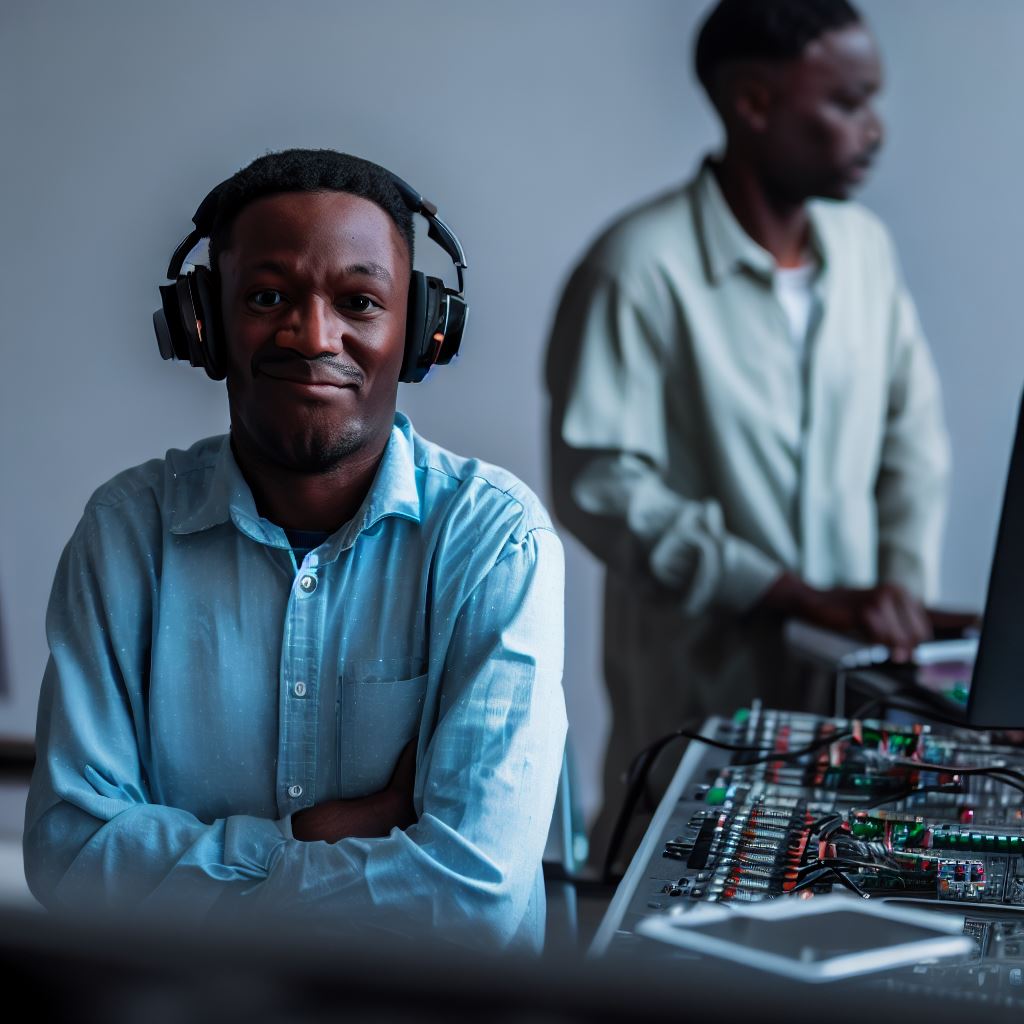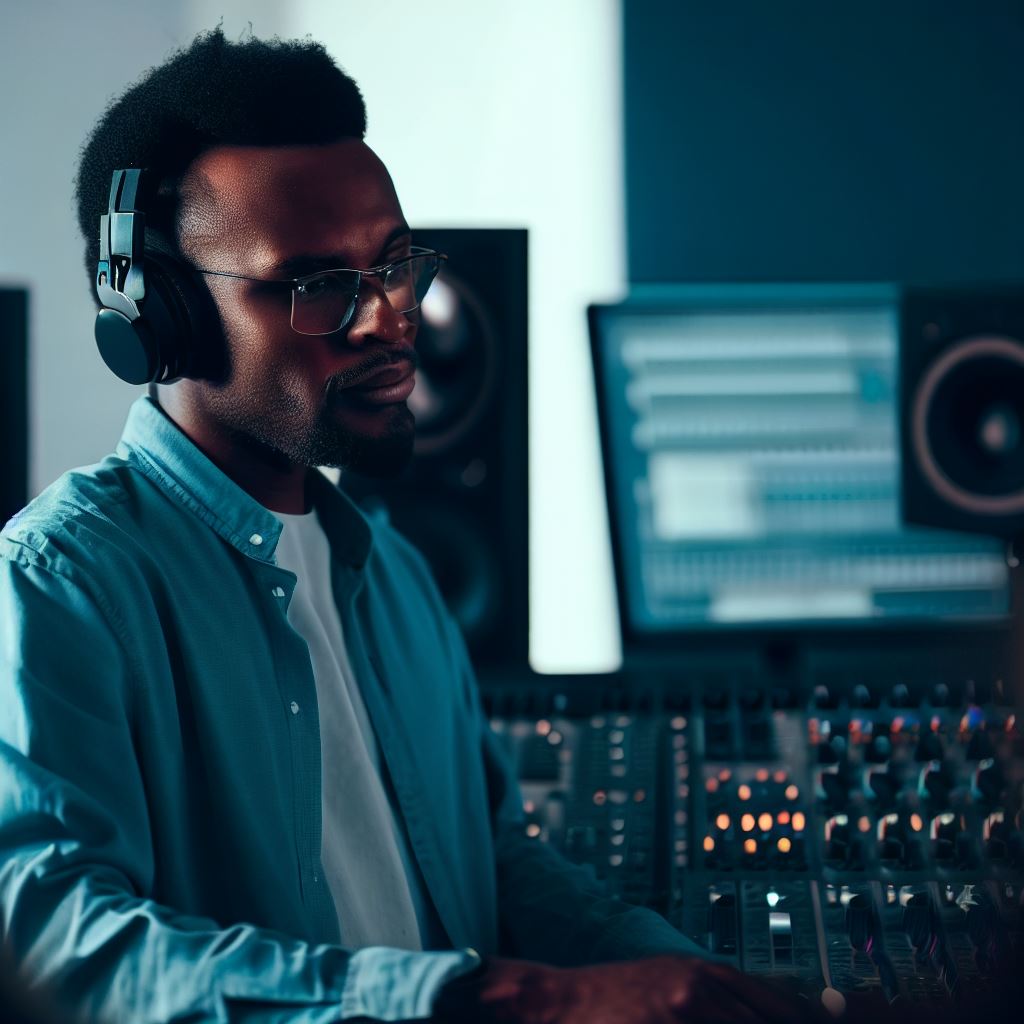Introduction
Sound engineering is a field that involves recording, manipulating, and reproducing sound using technological equipment and techniques.
It plays a crucial role in various industries such as music, film, broadcasting, and live events.
In Nigeria, sound engineering has seen significant growth and development over the years.
Definition of sound engineering
Sound engineering encompasses the technical aspects of sound production and manipulation.
It involves the use of equipment like microphones, mixers, and speakers to capture, process, and reproduce sound.
Importance of sound engineering in various industries
Sound engineering is essential in industries like music, where it helps in recording and producing high-quality music.
In film and broadcasting, it ensures that sounds are clear and synchronized with visuals.
In live events, sound engineering is vital for delivering a memorable audio experience to the audience.
Overview of sound engineering in Nigeria
Nigeria, known for its vibrant music industry, has witnessed a rise in the demand for skilled sound engineers.
The country has seen the emergence of world-class recording studios, where local artists and international acts come to produce their music.
Sound engineers in Nigeria play a pivotal role in creating hit songs and shaping the sound of Nigerian music.
In fact, sound engineering is a critical aspect of various industries, including music, film, broadcasting, and live events.
In Nigeria, the field has experienced significant growth and is contributing to the success of the vibrant music industry.
Skilled sound engineers are in high demand, and their expertise is shaping the sound of Nigerian music.
Current State of Sound Engineering in Nigeria
Growth and Development of the Sound Engineering Industry
The sound engineering industry in Nigeria has experienced significant growth and development in recent years.
With the rise of the music and entertainment industry in the country, there has been an increasing demand for skilled sound engineers.
Key Players and Professionals in the Field
There are many key players and professionals in the sound engineering field in Nigeria.
These individuals and companies play a crucial role in shaping the industry and pushing it forward.
Some of the notable names include:
- Don Jazzy: The renowned music producer and sound engineer has played a vital role in the development of sound engineering in Nigeria.
- Cobhams Asuquo: He is a highly respected sound engineer known for his work in the Nigerian music industry.
- Studio Magic: This production duo has gained recognition for their exceptional sound engineering skills.
Challenges Faced by Sound Engineers in Nigeria
Despite the growth and development of the sound engineering industry in Nigeria, professionals in the field face several challenges as they navigate their careers.
Some of the most common challenges include:
- Lack of proper infrastructure and equipment: Sound engineers often have to work with limited resources and outdated equipment, which hinders their ability to deliver high-quality work.
- Insufficient training and educational opportunities: There is a lack of specialized sound engineering courses and institutions in Nigeria, making it difficult for aspiring sound engineers to acquire the necessary skills and knowledge.
- Low recognition and value: Sound engineers are often overlooked and undervalued in the Nigerian music industry, leading to a lack of respect and fair compensation for their work.
- Unfavorable work environments: Many sound engineers in Nigeria face challenging work environments, such as inadequate studio spaces and excessive noise pollution, which negatively affect their productivity and creativity.
In short, the sound engineering industry in Nigeria has experienced significant growth and development, thanks to the rise of the music and entertainment industry.
However, professionals in the field face numerous challenges, including limited resources, lack of training opportunities, low recognition, and unfavorable work environments.
Addressing these challenges is crucial for the continued progress and success of sound engineering in Nigeria.
Emerging Sound Engineering Technologies in Nigeria
Sound engineering in Nigeria has seen significant advancements in recent years, with various emerging technologies revolutionizing the industry.
These technologies have not only improved the quality of sound production but have also enhanced the overall sound engineering experience.
In this section, we will explore some of the key emerging sound engineering technologies that are making waves in Nigeria.
Digital Audio Workstations (DAWs) and Software Tools
Digital audio workstations, commonly known as DAWs, have become an essential tool for sound engineers in Nigeria.
DAWs are computer-based software applications that allow recording, editing, and producing digital audio.
With the advancements in technology, DAWs have become more accessible and user-friendly, enabling sound engineers to create professional-grade audio tracks with ease.
Some popular DAWs used in Nigeria include Pro Tools, Logic Pro X, and FL Studio.
In addition to DAWs, there are several software tools available that specifically cater to sound engineering needs.
These tools offer advanced features like noise reduction, audio restoration, and audio manipulation, allowing sound engineers to perfect their recordings.
For example, iZotope RX is a widely used software tool in Nigeria for audio restoration and repair.
Advanced Mixing and Mastering Techniques
Mixing and mastering are crucial stages in sound engineering that determine the final sound quality of a project.
In recent years, advanced techniques and tools have emerged, revolutionizing the mixing and mastering process in Nigeria.
Sound engineers now have access to powerful equalizers, compressors, and audio processors that enable them to fine-tune and enhance various elements in a mix.
This has resulted in richer and more dynamic sound productions.
Moreover, emerging mastering technologies like LANDR have gained popularity in Nigeria.
LANDR is an AI-powered online mastering platform that analyzes audio files and applies automated mastering techniques to optimize sound quality.
This technology has made professional mastering accessible to a wider audience, including independent artists and amateur sound engineers.
Virtual Reality (VR) and Augmented Reality (AR) Applications in Sound Engineering
Virtual reality and augmented reality have made significant strides in various industries, and sound engineering is no exception.
In Nigeria, sound engineers are exploring the potential of VR and AR technologies to create immersive sound experiences.
VR headsets equipped with spatial audio technology allow users to experience sound in a three-dimensional environment, enhancing the overall immersion.
Similarly, AR applications enable sound engineers to integrate virtual sound elements into real-world environments, offering unique audio experiences.
Live Sound Innovations and Equipment Advancements
The live sound sector in Nigeria has witnessed notable innovations and advancements in technology.
From concert venues to music festivals, sound engineers are embracing cutting-edge equipment and techniques to deliver exceptional live sound experiences.
This includes the use of advanced sound reinforcement systems, digital mixing consoles, and wireless microphone technologies.
Additionally, the integration of immersive audio technologies like Dolby Atmos is gaining momentum in live sound setups, enhancing the spatial audio experience for the audience.
In essence, sound engineering in Nigeria is undergoing a transformative phase, driven by emerging technologies.
From digital audio workstations and software tools to advanced mixing and mastering techniques, virtual reality and augmented reality applications, and live sound innovations, these technologies are reshaping the industry and raising the bar for sound quality and creativity.
Nigerian sound engineers have embraced these advancements, propelling the country’s sound engineering scene to new heights.
Read: How to Become a Sound Engineer in Nigeria
Impact of Sound Engineering Tech Trends on Nigerian Music Industry
Sound engineering technology has made a significant impact on the Nigerian music industry, revolutionizing the way music is recorded, produced, and consumed.
These advancements have greatly influenced the industry, leading to enhanced quality and production value in music recordings.
Enhanced quality and production value in music recordings
- Advanced sound engineering tools and software have allowed Nigerian music producers to achieve higher quality recordings.
- With access to state-of-the-art equipment, artists can now capture every nuance and detail, resulting in a more immersive listening experience.
- Better production value has also enabled Nigerian musicians to compete on a global scale, attracting international collaborations and recognition.
Exploration of new genres and experimental sounds
- Sound engineering technology has encouraged Nigerian artists to explore new genres and experiment with unique sounds.
- By pushing boundaries and incorporating innovative techniques, they have been able to create distinct identities and carve out niche markets.
- This diversity has led to increased creativity and originality, adding fresh perspectives to the Nigerian music scene.
Accessibility and democratization of sound engineering tools for aspiring artists
- Previously, access to sound engineering tools was limited to a select few due to their high cost and availability.
- However, recent tech trends have made these tools more accessible, allowing aspiring Nigerian artists to create professional-grade recordings on a budget.
- With affordable home studios and user-friendly software, talented individuals now have greater opportunities to showcase their music talent.
Influence on the music production process and creative freedom
- Sound engineering technology has revolutionized the music production process, empowering artists with greater control over their sound.
- Producers can now manipulate recordings, experiment with effects, and fine-tune every element to match their creative vision.
- This has resulted in a newfound creative freedom, allowing Nigerian musicians to express themselves authentically and push artistic boundaries.
In general, the impact of sound engineering tech trends on the Nigerian music industry has been significant.
It has elevated the quality and production value of music recordings, encouraged exploration of new genres and experimental sounds, made sound engineering tools accessible to aspiring artists, and empowered musicians with greater creative freedom.
As technology continues to evolve, the Nigerian music industry is poised for further growth, innovation, and international recognition.
Read: Top Sound Engineering Schools in Nigeria

Sound Engineering Tech Trends in Film and TV Production in Nigeria
Sound engineering technology has come a long way in the film and TV production industry in Nigeria.
With advancements in sound design and post-production techniques, immersive audio experiences have become a crucial component of movies and television shows.
This section will explore the various trends in sound engineering tech and its integration in Nollywood, as well as the collaboration between sound engineers and filmmakers.
Sound Design and Post-Production Advancements
- The advancements in sound design and post-production have greatly enhanced the quality of audio in Nigerian films and TV series.
- Sound engineers utilize cutting-edge software and equipment to create immersive soundscapes and improve the overall audio experience.
- This includes techniques such as Foley effects, sound mixing, and mastering, which contribute to a more realistic and engaging audio environment.
- Improved sound design allows for better storytelling and emotional impact, as sound effects can enhance the mood and atmosphere of a scene.
Immersive Audio Experiences in Movies and Television
- Immersive audio experiences have become a trend in Nigerian movies and television, aiming to transport viewers into the world of the story.
- 3D audio technologies, such as Dolby Atmos, are being used to create a more realistic and multidimensional sound experience.
- Viewers can now feel immersed in the movie or TV show through the spatial placement of sounds, enhancing their overall enjoyment.
- This technology allows sound engineers to have greater control over the placement and movement of sound elements within a scene.
Integration of Sound Engineering Technologies in Nollywood
- Nollywood, the Nigerian film industry, has gradually embraced sound engineering technologies to improve the quality of its productions.
- This includes investing in state-of-the-art recording studios, sound mixing facilities, and hiring skilled sound engineers.
- The integration of sound engineering tech has resulted in enhanced soundtracks and improved audio clarity in Nigerian movies.
- The industry’s growth in sound engineering has positioned Nollywood to compete with international standards in audio production.
Collaboration between Sound Engineers and Filmmakers
- Collaboration between sound engineers and filmmakers is crucial to achieving the desired audio quality in Nigerian movies and TV shows.
- Sound engineers work closely with directors, editors, and cinematographers to ensure that the audio complements the visual elements.
- They contribute creative ideas and expertise during pre-production, production, and post-production stages.
- This collaboration results in a symbiotic relationship where sound engineers elevate the storytelling through their technical skills.
Basically, sound engineering tech trends in the Nigerian film and TV production industry are shaping the way audio is created and experienced.
Advancements in sound design and post-production techniques, alongside immersive audio experiences, are becoming integral to the success of movies and television shows in Nigeria.
The integration of these technologies in Nollywood, coupled with collaborations between sound engineers and filmmakers, enables the industry to deliver high-quality audio productions that can compete globally.
Read: Nigerian Sound Engineers: Success Stories
The Role of Sound Engineering in Events and Concerts in Nigeria
Importance of Sound Reinforcement and PA Systems
Sound reinforcement and PA systems play a crucial role in delivering high-quality audio experiences at events and concerts in Nigeria.
They ensure that every attendee can hear the performances clearly and without distortion.
These systems amplify sound from the stage and distribute it evenly throughout the venue, ensuring that both vocal and instrumental sounds reach the audience with optimal clarity.
They enhance the overall production value of events, making them more enjoyable and memorable.
Innovations in Audio Equipment and Setups
Nigeria’s sound engineering industry has witnessed significant advancements in audio equipment and setups, enabling engineers to achieve exceptional sound quality.
Many event organizers now invest in state-of-the-art sound equipment, such as advanced speakers, mixing consoles, and audio processors.
Moreover, the introduction of digital audio technology has revolutionized the way sound engineers operate.
Digital mixers offer precise control over sound elements and allow for real-time adjustments, resulting in seamless performances.
Sound Engineering Challenges Faced at Large-Scale Events
Large-scale events in Nigeria present unique challenges for sound engineers.
Managing audio for a massive audience involves dealing with complex factors like venue acoustics, crowd noise, and the diversity of musical genres.
Ensuring consistent sound quality throughout the venue can be particularly challenging, as different areas may have varying acoustic characteristics.
Sound engineers must extensively analyze and adapt their setups to deliver the same audio experience to all attendees.
Trends in Interactive and Immersive Live Sound Experiences
Sound engineering in Nigeria is witnessing a shift towards interactive and immersive live sound experiences.
These experiences incorporate technologies like surround sound, advanced audio effects, and real-time audience participation.
With the rise of virtual reality and augmented reality, sound engineers are exploring new possibilities to create multidimensional soundscapes that blend seamlessly with visual elements.
This trend enhances the overall engagement and emotional impact of live events.
Furthermore, interactive sound experiences, where the audience can control certain audio elements or provide live feedback, are gaining popularity.
This allows for a more personalized and interactive connection between performers and attendees.
In a nutshell, sound engineering plays a critical role in ensuring top-notch audio quality at events and concerts in Nigeria.
The continuous advancements in audio equipment and setups help sound engineers overcome challenges and deliver immersive experiences.
By embracing interactive and immersive trends, the industry is expanding the possibilities of live sound and creating unforgettable moments for audiences.
Read: Salary Overview: Sound Engineers in Nigeria
Career Opportunities and Skills in Sound Engineering in Nigeria
In Nigeria, the demand for sound engineers is rapidly increasing across various industries.
Whether it’s in music production, film, television, or live events, sound engineers play a crucial role in ensuring top-notch audio quality.
Let’s explore the career opportunities and skills required for aspiring sound engineers in Nigeria.
Demand for Sound Engineers in Various Industries
The need for skilled sound engineers is evident in Nigeria’s thriving entertainment industry.
With the rise of Nollywood and the ever-growing music scene, sound engineers are in high demand.
They are needed in music studios, film production houses, broadcasting companies, event management firms, and even in educational institutions.
Required Qualifications and Skills for Aspiring Sound Engineers
To excel as a sound engineer in Nigeria, certain qualifications and skills are essential.
Firstly, a solid understanding of sound equipment and technology is crucial.
Knowledge in audio mixing, recording techniques, and signal processing is a must.
Additionally, having a creative ear for music and sound is highly valued in the industry.
There are several educational routes to pursue a career in sound engineering.
Many universities, colleges, and specialized institutions offer courses and programs in audio engineering.
The most recognized qualification is a Bachelor’s degree in Sound Engineering or a related field.
However, some professionals have achieved success through self-taught learning and hands-on experience.
Training and Educational Resources Available in Nigeria
Fortunately, Nigeria has seen an increase in training and educational resources for aspiring sound engineers.
There are institutes and academies dedicated to sound engineering, providing comprehensive courses.
These programs cover topics such as sound recording, music production, live sound reinforcement, post-production, and more.
Furthermore, various workshops, seminars, and conferences are organized periodically to enhance the skills of sound engineers.
These events often feature renowned industry professionals who share their expertise and provide valuable insights into the field.
Future Prospects and Potential Growth in the Field
The future of sound engineering in Nigeria looks promising.
As the entertainment industry continues to expand, the demand for high-quality audio production will only increase.
Sound engineers can anticipate growth opportunities in music production, film post-production, and live events.
Additionally, technological advancements in audio equipment and software provide exciting prospects for sound engineers. Keeping up with the latest trends and upgrading skills accordingly will be crucial for maintaining a successful career in this field.
Therefore, sound engineering offers a wide range of career opportunities in Nigeria.
With the right qualifications, skills, and training, aspiring sound engineers can thrive in the flourishing entertainment industry.
Continuous learning and adapting to evolving technologies will ensure a successful and fulfilling career in sound engineering.
Conclusion
Throughout this blog section, we have explored the significant role of sound engineering tech trends in Nigeria.
These trends have brought about a revolution in the Nigerian creative industries, opening up new possibilities for musicians, filmmakers, and other artists.
The impact of sound engineering tech trends in Nigeria cannot be underestimated.
It has allowed artists to create high-quality productions, enhancing their ability to reach a wider audience and compete on a global scale.
With advancements in sound engineering technology, Nigerian musicians are able to produce music that matches international standards, attracting international collaborations and recognition.
Similarly, filmmakers can now create immersive soundscapes that enhance the cinematic experience, captivating audiences both locally and internationally.
Furthermore, the growth of sound engineering tech trends has the potential to create employment opportunities for skilled individuals in Nigeria.
As the demand for sound engineers and technicians increases, more Nigerian youths can pursue careers in this field, contributing to the growth of the country’s creative industries.
Ultimately, sound engineering tech trends have revolutionized the Nigerian creative industries, bringing about a new era of possibilities.
It is crucial for artists and aspiring sound engineers to further explore and embrace these trends to stay relevant and competitive in the global market.
By embracing sound engineering technology, Nigerian artists can continue to push boundaries, create extraordinary experiences, and leave a lasting impact on the world stage.




